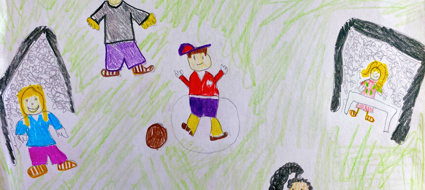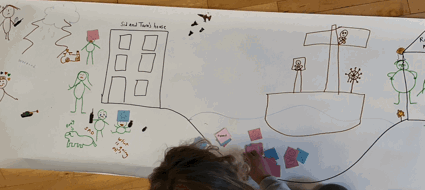Communicating effectively with children in direct work can be challenging. Upcoming workshops will consider the skills and approaches that practitioners can use to enable them to communicate effectively with children.
I was fantastic at direct work with children when I first qualified. Or at least I thought I was.
I often left sessions with children, having had lots of fun with them and with a ton of information about them. It was just not always the relevant information.
When I visited Lola*, a 7-year-old girl with curly chestnut hair, I found out everything about her. I knew her favourite food, colour, TV programme, best friend, best lesson, worst lesson, favourite teacher and much more.
Yet, I had no idea how she felt about the police coming to her house the night before when they arrested her dad after he violently assaulted her mum. She wasn't going to bring it into the conversation, and when I first started working as a social worker, neither was I.
Let's instead talk and draw about happy and safe topics, pretending everything is okay.
The challenges
Undertaking direct work with children can be the most rewarding part of being a social worker. Indeed, it's why most of us come in to do the work. Yet, it can also be the most challenging. Simple in theory, hard in practice.
As social workers, we are often taught about effective communication with children, but direct work in child protection is a special type of direct work, fraught with difficulties and dilemmas.
First, there is a society-wide, implicit agreement about protecting and shielding children from adult topics. As a result, I had acquired a sentimental view of childhood and wanted to preserve the innocence of the children I was working with.
Secondly, I didn't feel confident talking about such sensitive topics, and my fear and apprehension about saying the wrong thing meant I would avoid saying anything. In my experience, children have a robust detector for assessing whether I am trustworthy, sensitive, and able to handle their thoughts and feelings. I found that if a child sensed that I felt nervous or apprehensive about talking about their mum and dad fighting or taking drugs, then they would instinctively withdraw and withhold sharing anything with me.
Overcoming challenges
A key realisation was that whatever I thought I was protecting the children from, they had already lived through it. I was avoiding topics such as mum and dad fighting, dad drinking alcohol and mum being depressed, believing that a child shouldn't be exposed to such topics, yet, in some cases, this was their day-to-day reality.
So, was I protecting them, or was I protecting myself?
Polly Baynes references the work of Dr Vera Fahlberg in her Life Story Work: Practice Tool:
The very fact that adults hesitate to share with a child information about his or her past implies that it is so bad that the young person won't be able to cope with it. Whatever the past was, the child has lived through it and survived.
I also learned about the work of James Pennebaker, Professor Emeritus of Psychology at the University of Texas at Austin, who found that not talking about a distressing event or experience can be as – or more – harmful than the event itself.
Under the guise of sensitivity, I was depriving children of a chance to speak about some of the most distressing and difficult experiences in their lives, and being unable to talk could have long-term effects on them and their well-being.
Crafting capabilities: Clever tools, techniques, and confidence
Over time, I learned about and developed techniques that made a huge difference in connecting with children and getting to the heart of the issues. We will explore this more in forthcoming workshops on Child-centred communication in child protection.
What communication skills are essential for impactful direct interactions with children? A series of upcoming workshops will consider the skills and approaches that practitioners can use to enable them to communicate effectively with children.
Developing effective communication skills to improve the quality of interactions with children is an integral component of frontline practice. This online workshop will explore more fully the challenges of direct work with children and how to overcome them. It will involve opportunities for sharing and practising skills and techniques to help you feel more confident about undertaking direct work with children so that you can make a positive difference to their lives.
*A pseudonym




